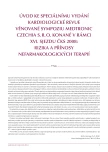-
Medical journals
- Career
BIOPROSTHESIS FOR AORTIC VALVE REPLACEMENT: conclusions after 10-Year Experience in 1,673 Stentless Bioprosthesis
Authors: U. Rosendahl; S. Bauer; F. Dalladaku; A. Albert; I. C. Ennker; K. Bauer; I. Florath; J. Ennker
Published in: Kardiol Rev Int Med 2008, 10(Mimořádné): 6
Overview
Objective:
Between 04/1996 and 12/2007 a total of 1 673 stentless Freestyle Bioprosthesis were implanted in our institution: Complete follow up was gained for 1 014 patients undergoing surgery between 1996 until 12/2005 (subcoronary: N = 845; full root: N = 169). Total follow up was 2 952 patient-years. In order to assess quality of life, follow-up data was obtained in the years 2001, 2003 and 2006 by mailed questionnaires and telephone interview (implementing the standardized Notthingham Health Profile (NHP). Methods: Based on the propensity score 148 patient-pairs were matched. Total follow-up of the matched population was 393 patient-years in the subcoronary group and 400 patient years in the full root group. (p = 0.83).Results:
Operative Moratlity was 2.7 % in the subcoronary group and 4.7 % in the full root group. After adjustment for different patient characteristics no significantly increased operative mortality was observed for the full root implantation technique. In the subcoronary technique smaller sized valves were implanted. In the full root technique lower gradients for each valve size were found. QoL was similar to the general German population and there was no difference between implantion techniques. Survival after 10 Years was 70.8 ± 6.0 % (9 years 33.4 ± 10.9) for he SC group and 78.1 ± 4.9 % (9 years 33.9 ± 24.2 %) for the TR group.Conclusions:
The 10 years results of the stentless Medtronic Freestyle prosthesis are promising. The full root technique significantly improves hemodynamics. Both techniques have a similar rate of reoperation. No structural valve deterioration was observed for the full root implantation technique. There is a trend is towards full root replacement and increase of simultaneous operations regarding ascending aortic aneurysms. Offering so far excellent long term results, stentless aortic Bioprosthesis should be considered for aortic valve replacement also in younger patients who do not want to be on any anticoagulation regime while stented bioprosthesis would often not be considered in younger patients.
Labels
Paediatric cardiology Internal medicine Cardiac surgery Cardiology
Article was published inCardiology Review

2008 Issue Mimořádné-
All articles in this issue
- Electromagnetic interference in patients with implants.
- Interventional cardiology 2008: historical notes, current status and trends
- Non-pharmacological treatment of AMI – present status and future prospects
- Catheter ablation for atrial tachyarrhythmias: which patients are indicated for the procedure and what is the follow-up care?
- BIOPROSTHESIS FOR AORTIC VALVE REPLACEMENT: conclusions after 10-Year Experience in 1,673 Stentless Bioprosthesis
- Cardiology Review
- Journal archive
- Current issue
- Online only
- About the journal
Most read in this issue- Electromagnetic interference in patients with implants.
- Catheter ablation for atrial tachyarrhythmias: which patients are indicated for the procedure and what is the follow-up care?
- Interventional cardiology 2008: historical notes, current status and trends
- Non-pharmacological treatment of AMI – present status and future prospects
Login#ADS_BOTTOM_SCRIPTS#Forgotten passwordEnter the email address that you registered with. We will send you instructions on how to set a new password.
- Career

